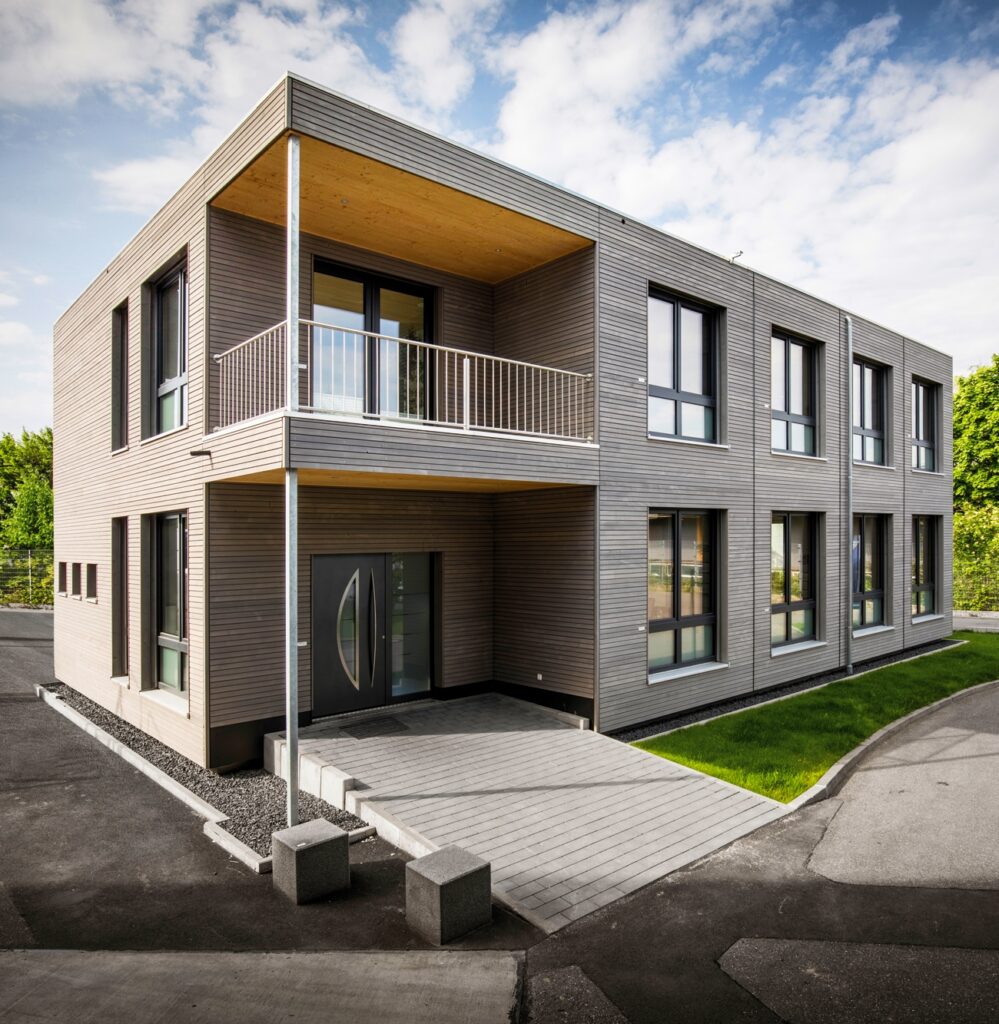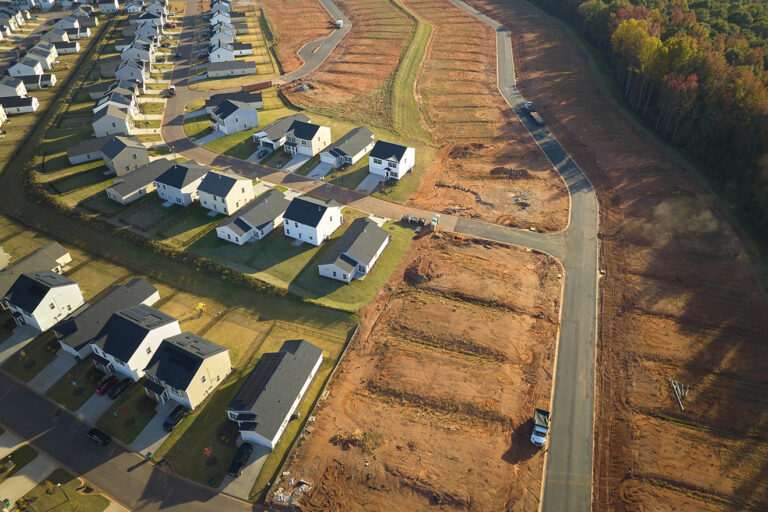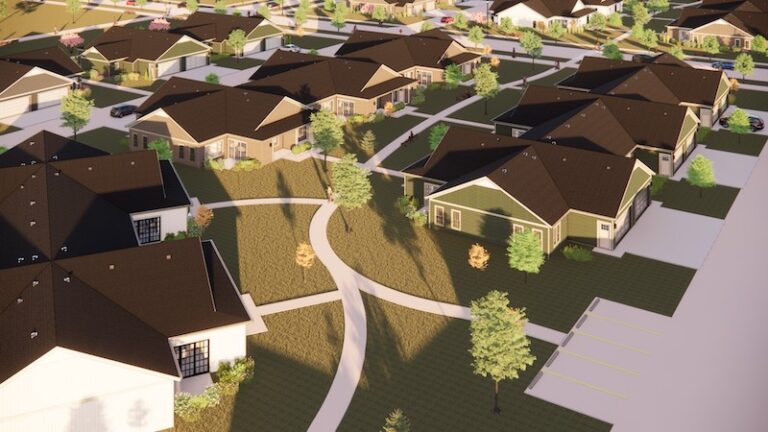With Colorado facing a housing affordability crisis, offsite and modular construction may provide a solution.
It’s been a banner era for residential real estate in Colorado.
Zillow ranked Colorado as having the fifth-highest typical home value of any state, a number that eclipsed $600,000 in 2022. The dark lining to this seemingly silver cloud is a statewide affordability crisis.
Modular and other offsite construction represents a potential salve, and the state government has embraced it. Gov. Jared Polis even gave a nod to Buena Vista-based modular manufacturer Fading West Development in his 2023 “State of the State” address.
“It’s his No. 1 agenda item,” says Fading West founder and CEO Charlie Chupp. “We have to solve it. It’s just getting worse.”
Now about 200 employees, Fading West opened its 110,000-square-foot factory with a single production line in Buena Vista in late 2021. The company has designs on manufacturing in a bigger one — 220,000 square feet with two lines, to be precise — on the Front Range by 2025.
About 85 percent of Fading West’s output is workforce housing, largely in Colorado’s mountain towns. “We’ve got our first big multifamily project through a partnership with Breckenridge starting in March,” Chupp says. “It’s a public/private partnership to build 60 workforce housing apartments.”
While the National Association of Home Builders estimated that only 2 percent of single-family homes were built offsite in 2021, modular construction is poised to grow for Colorado, Chupp says. “The things that the manufacturing process will bring to construction is efficiency, speed and supply,” he says. “We’re still 10 to 20 percent less expensive, and this factory can build 400 to 600 homes a year, and we can work all year-round.”
Labor (or lack thereof) is another big factor, he adds, noting that forecasts estimate that more than 40 percent of the current construction industry’s workforce will retire in the next decade.
Chupp plans to leverage the state’s new Innovative Housing Incentive Program (IHIP) to expand capacity in Buena Vista and beyond. The program is allocating $40 million to manufacturers in the form of working capital grants, per-unit incentives, and factory development loans.

Jack Tiebout, senior program manager at the Colorado Office of Economic Development and International Trade (OEDIT), is overseeing IHIP. “The governor and the legislature are really prioritizing solutions we can use to address the housing shortage across the state,” Tiebout says. “Affordability is absolutely the main driver.”
The program is unique, Tiebout adds.
“There are other programs across the country that work to support innovative housing and modular housing in different forms. Those other programs that I know of are on a project-by-project basis and geared toward the developers. We have not seen another program across the country that has directly worked to incentivize and help grow the manufacturers themselves.”
Starting up in 2020, Golden-based Addazu is a new entrant in the state’s modular construction sector. The company is working with a contract manufacturer to build components and has built a prototype structure in Denver.
Founder and CEO Kelly Pickering says Addazu is focused on flexibility through innovation in manufacturing. “What we’re really trying to do is build out a system that can be reconfigured pre- or post-construction,” he explains. “We don’t have a set floor plan.”
Pickering notes that the state support is a definite catalyst.
“It’s a really exciting time to be in the modular construction industry in the state of Colorado,” he says. “They’re just doing a number of things to help push the industry forward, and we’re definitely leaning into all of that.”
A number of other offsite building startups are in launch or soon-to-launch mode, including Higher Purpose Homes in Durango, indieDwell in Pueblo, and Mosaic Housing in Grand Junction.
Not that modular construction is a new idea. The first prefabricated house was shipped from England to Massachusetts in the 1600s; Sears kit homes took off in the early 1900s, and the U.S. industry boomed in the 1970s.
Several manufacturers in Colorado’s offsite building sector have been at it for a decade or more. Siblings Bill and Kate McDonald started Phoenix Haus in Detroit in 2010 before moving to Grand Junction in 2017, due largely to the fact that most of their customers were in the Rockies. In 2022, the 15-employee company cut the ribbon on a new 20,000-square-foot factory.
The company manufactures panels for energy-efficient passive houses that range from 900 to 3,000 square feet. Mountain towns across the region remain the target market, and about 80 homes have been built with Phoenix Haus panels to date.
Bill points to McKinsey & Company’s 2020 report, “The next normal in construction,” which estimates that offsite construction could account for more than 20 percent of new housing by 2035. Offsite construction “collapses the supply chains. You can efficiently source as much as you can get your hands on to avoid the high-priced labor dollar in the mountain markets,” he says.
More than 40 percent of housing is currently built offsite in Scandinavia and the United Kingdom.
“You go to Europe, it’s just like I’m saying and McKinsey’s saying: You’re shipping in way more of the finished building blocks and there’s more of an assembly focus at the worksite,” Bill says. “In Colorado specifically, less than 5 percent of construction starts are offsite, so there’s a lot of runway there for this to grow and to fill in with companies looking to meet that customer demand.”
A subsidiary of Denver-based Clayton Properties Group, Precision Building Systems (PBS) has built about 20,000 modular homes since its founding in 2017. President Jay Small says the model makes for more precise builds. “It all goes together kind of like a puzzle, but an easy puzzle,” he says.
It also accelerates construction considerably. “An ideal build today in this market [Denver] is about eight months for site-built,” says Small. “We can do it in 60 days.”
The PBS operation is moving from its 200,000-square-foot facility in central Denver to a larger factory on 53 acres in Brighton; groundbreaking is slated for Q3 2023. “Right now, we can only build two houses a week,” Small says. “We’ll be able to go from building two houses a week to four houses a day.”
The resulting economies of scale will drive down costs. “Your cost per unit will be less, and that goes right to the consumer,” Small says. “That’s the real hook.”
Launched in July 2022, On2 Homes represents the first foray into modular housing for Clayton’s Oakwood Homes. On2 is selling PBS-built homes that start around $350,000 in the Green Valley Ranch neighborhood near Denver International Airport. “That same house stick-built would probably be $450,000,” Small says, noting that the lots themselves cost about $90,000.
On2 President Kristen Nelson describes a brisk pace of inquiries and foresees opportunities in both infill development and master-planned communities. On2 has about 20 contracts for homes on the 96 sites as of early 2023.
“The demand is there for homeownership, but people can’t necessarily afford it,” Nelson says. “What we’re trying to do is make the product so attainable that renters can actually get their foot in the door and start building equity themselves.”
However, there is a reputational hurdle to clear. “People hear ‘modular’ and they think of a single-wide or double-wide that can be transported. Those are actually the manufactured products,” Nelson says. “We’re actually required to follow the same stipulations and the same inspection process that a stick-built home is, so that’s what makes us different from the manufactured products.”
In the end, however, it’s a numbers game, and the numbers remain relatively small. When its new factory comes online, PBS will be able to make upwards of 1,500 units annually. Fading West could hit a similar number if a Front Range facility starts up in 2025, but other startups in the state will likely need years to hit that level of production. “You’re not going to solve the problem very quickly at that rate,” Small says.
Originally published on ColoradoBiz.com by Eric Peterson on March 30, 2023.




